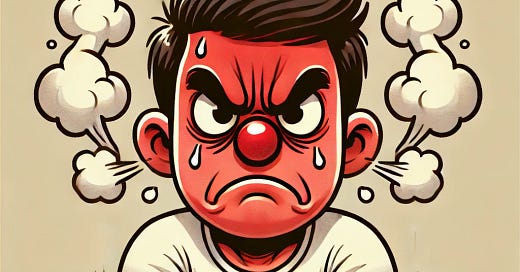Introduction
Our last essay argued that one’s idea about how to live a good life is tied to hidden cultural influences and it’s important to be aware of them. In today’s essay, we dive into the role attitude plays in forming one’s idea about living a good life.
You Got a Bad Attitude!
What is attitude, anyway? Here’s one definition from the online American Heritage Dictionary:
A manner of thinking, feeling, or behaving that reflects a state of mind or disposition.
This definition indicates a complex set of factors at play that influence one’s attitude. Attitude isn’t a single solid thing, like a rock we bend down to pick up off the ground while walking along on a hiking trail in the woods.
Attitude And Kimchee
Some attitudes form quicker than others, like the first time I ate spicy Korean pickled cabbage, kimchee. As soon as I began chewing the first bite, it felt like tiny, hot, unpleasant jolts of electricity were zapping the roof of my mouth and tip of my tongue! I’ll never touch this stuff again. I hate it! I cried out in my mind, as I wriggled uncomfortably in my chair while spitting the kimchee back on my plate. I felt it would be impossible to ever like this Korean vegetable. My lips started to tingle and go numb, reminding me of the time when a small yellow jacket, hidden inside a soda can I’d opened and left out on my desk, stung my lower lip just as I lifted the can for another sip.
Prior to eating kimchee, I’d never tried any kind of Asian food, except Chinese, not known for spicy foods. Growing up in America, my taste buds were familiar with mildly seasoned food, sweet tasting desserts, and sugary soda drinks. (Yikes!) As I got more familiar with Korean culture and cuisine, I learned kimchee is supposed to be eaten in combination with rice, vegetables, and meat, not as a stand-alone item. I learned the rice absorbs some of the acidic, spicy elements of this pickled cabbage, and the vegetables and meat help round out the overall taste of the kimchee.
Armed with this new information, I decided to put it into practice and braved another shot at eating kimchee. To my surprise, I enjoyed the taste much more than the first time. No burning, numbing sensation in my mouth or on my lips. Bit by bit, over the next few weeks, I was able to cultivate a refined taste for this once-abhorred Korean cuisine. Oddly enough, after six months, I found myself always wanting to consume kimchee whenever I went to a Korean restaurant. I was surprised at how much my attitude changed from the time I first bit into kimchee, swearing to myself I’d never touch the stuff again.
Stepping back and being willing to reconsider my initial experience with kimchee allowed me to gain new knowledge and insight on how to eat it. I was able to alter my attitude by one hundred eighty degrees, moving from one of repulsion to one of hearty embrace. Conversely, someone might decide after an unpleasant experience eating kimchee to never go near the stuff again, or any other kind of Asian food. Each attitude we form is always accompanied by resultant consequences. Hopefully, the attitudes we form throughout life allow us to experience our version of what it means to live a good life.
Attitude and Living a Good Life
Taking periodic inventory of the attitudes we’ve come to hold in life is probably a good idea. Doing so gives us a chance to reflect, reconsider, and maybe adjust mindsets or behaviors we’ve come to reflexively hold that may be hindering our ability to live a good life.
Here’s a short checklist to work with if you’d like to do an attitude inventory check:
· Is there someone in my life—past or present—who hurt me that I feel I never want to talk to or see again?
· How many times during the day do I listen to negative self-talk about myself that convinces me I will never be able to live the kind of life I want to?
· Right now, do I have a clear picture of the steps I need to take to live the kind of life I believe I deserve to live?
Conclusion
The desire to live a good life is the aim of all of us. I can’t think of anyone who gets up in the morning wishing to lose something or end up worse off at the end of the day. Awareness of how our attitudes impact our desire to live a good life can potentially lead us to change or adjust our mindset or behavior, if needed.
Next time we will explore the role beliefs play in shaping and influencing our desire to live a good life.
Until then—here’s to your spiritual health!





Kimchee is addicting that's for sure. Maybe a good attitude can be nurtured like a good habit.